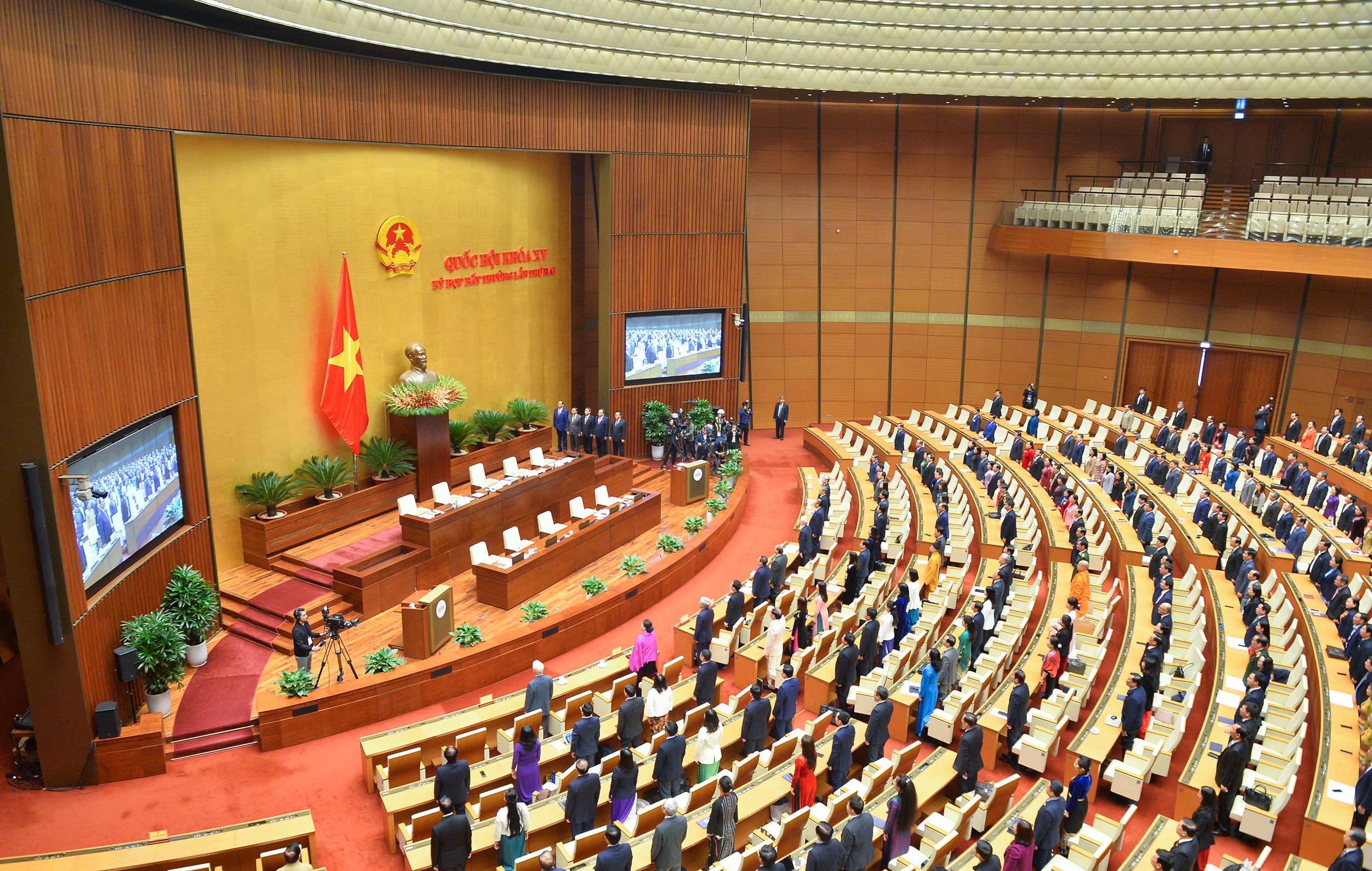Development of human resources to advise on law-making in Vietnam until 2030
Scheme for the development of human resources to advise on law-making in Vietnam to meet task requirements by 2030, including 7 key tasks and solutions.

Development of human resources to advise on law-making in Vietnam until 2030 (Image from the Internet)
Development of human resources to advise on law-making in Vietnam until 2030
On August 27, 2024, the Prime Minister of Vietnam issued Decision 916/QD-TTg to approve the Scheme for developing human resources for advising on law-making to meet the task requirements until 2030. It requires the implementation of the following 7 tasks and solutions:
(1) Innovate thinking, raise awareness, and responsibility in developing human resources for advising on law-making
- Innovate thinking and raise the awareness of leaders of agencies and units about the importance of advising on law-making; the position, role of officials in advising on law-making, and the responsibility in building and developing this team.
- Raise awareness and sense of responsibility of officials involved in advising on law-making; avoid being influenced or impacted by unhealthy actions aiming to embed personal or group interests in law-making.
- Ministers, Heads of ministerial-level agencies, Chairpersons of People's Committees of provinces and centrally-governed cities should directly command the law-making work of ministries, central authorities, and local authorities.
- Prioritize selecting officials who have been trained or have experience in advising on law-making to participate in the drafting teams of legal normative documents.
- Strengthen discipline, order, anti-corruption, and prevent negative, group, personal interests in law-making; avoid passing the buck or shirking responsibility in law-making.
(2) Continue researching, reviewing, and completing legal regulations on recruitment, use, management of officials; regulations on attracting and honoring talented individuals in various sectors to ensure the quality of human resources in law-making.
(3) Attract, recruit, and honor talented individuals for advising on law-making
- Search and identify individuals with ethical qualities, exemplary lifestyles, a desire to contribute and serve the country and the people, who have superior creative abilities, to attract and recruit them into advising on law-making at ministries, central authorities, and local authorities.
- Implement policies to attract and honor talented individuals from outside the government sector to advise on law-making at ministries, central authorities, and local authorities.
- Encourage and highlight the responsibility of those who discover, introduce, and recommend talented individuals for advising on law-making.
- Develop programs and cooperation plans with domestic and international educational and training institutions to train and foster talented individuals in advising on law-making as per the needs of each agency or unit.
(4) Enhance capacities for officials involved in advising on law-making
- Consider the quality of human resources involved in advising on law-making as a breakthrough to enhance the quality of law-making.
- Develop and maintain a team of about 300 officials with adequate knowledge, superior skills, and experience in law-making to become the core force to train and develop human resources for advising on law-making at ministries, central authorities, and localities.
- Develop programs and innovate methods for training and professional development:
+ Increase knowledge and skills in law-making in the programs for training in state management skills as per the official rank standards; professional development programs as per job positions of leadership and management.
+ Innovate methods and improve the quality of training and professional guidance for officials advising on law-making, strengthen professional skills, and political resilience. Training and professional guidance should be based on practical needs, addressing issues arising in advising on law-making.
+ Develop reasonable content structures for training and workshop programs, combining theoretical study with exchange, discussion, and practical scenarios; a blend of classroom learning and practical exploration.
+ Develop and complete training materials, handbooks, and electronic lectures on law-making knowledge and skills.
+ Organize scientific workshops and practical surveys to study and construct frameworks for training programs and materials to meet the requirements.
(5) Enhance international cooperation and apply digital technology, information technology, and other technologies from the Fourth Industrial Revolution in supporting law-making
- Strengthen cooperation with renowned training institutions and international organizations to build quality training programs on law-making skills; promote the connection and sharing of law-making experiences both domestically and internationally.
- Intensify the application of digital technology, information technology, and other technologies of the Fourth Industrial Revolution in supporting law-making; complete the national databases on laws and international treaties ensuring accuracy, completeness, timely updates, transparency, and easy access.
- Strengthen information and communication about the role of human resources in advising on law-making, and about the Scheme for developing human resources for advising on law-making; establish and maintain regular sections and pages on law-making on several mass media channels.
(6) Commend, honor, and reward exemplary figures in advising on law-making, to create motivation for officials to develop intelligence, innovation, and successfully complete assigned tasks.
(7) Strengthen inspection and supervision of the Scheme's implementation. Conduct preliminary and final reviews of the implementation results.
- Key word:
- law-making
- Vietnam
- in Vietnam
- Number of deputy directors of departments in Vietnam in accordance with Decree 45/2025/ND-CP
- Cases ineligible for pardon in Vietnam in 2025
- Decree 50/2025 amending Decree 151/2017 on the management of public assets in Vietnam
- Circular 07/2025 amending Circular 02/2022 on the Law on Environmental Protection in Vietnam
- Adjustment to the organizational structure of the Ministry of Health of Vietnam: Certain agencies are no longer listed in the organizational structure
- Vietnam aims to welcome 22-23 million international tourists in Vietnam in 2025
-

- Number of deputy directors of departments in Vietnam ...
- 15:04, 05/03/2025
-

- Cases ineligible for pardon in Vietnam in 2025
- 14:43, 05/03/2025
-

- Decree 50/2025 amending Decree 151/2017 on the ...
- 12:00, 05/03/2025
-

- Circular 07/2025 amending Circular 02/2022 on ...
- 11:30, 05/03/2025
-

- Adjustment to the organizational structure of ...
- 10:34, 05/03/2025
-

- Notable new policies of Vietnam effective as of ...
- 16:26, 11/04/2025
-
.Medium.png)
- Notable documents of Vietnam in the previous week ...
- 16:21, 11/04/2025
-
.Medium.png)
- Notable documents of Vietnam in the previous week ...
- 16:11, 02/04/2025
-
.Medium.png)
- Notable new policies of Vietnam to be effective ...
- 16:04, 02/04/2025
-
.Medium.png)
- Notable new policies of Vietnam effective from ...
- 14:51, 21/03/2025

 Article table of contents
Article table of contents
